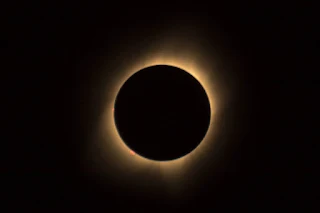A solar eclipse occurs when a portion of the Earth is engulfed in a shadow cast by the Moon which fully or partially blocks sunlight. This occurs when the Sun, Moon, and Earth are aligned. We are advised to not see the sun directly during solar eclipse without wearing any protective equipment. Well, there is a myth behind this. Is this true? And if it's not true then what's the reason behind it?
The Myth
During eclipse harmful and very intense rays will be reaching Earth, resulting in eye damage. (Because of this I wasn't allowed outside of my house during Eclipses).
The Science
Nothing varies in sun rays. Reduced light and intensity will reach us. But rays on non-ecliptic days are enough to damage our retina. Usually, on common days, our iris, pupil, and eyelid mechanisms contract our eyes, making us turn away from the Sun: that’s the reason why we shy away from it.
So what changed during Eclipse?
The sun won't be so bright due to the shadow part of the moon. Therefore, due to the reduced brightness, our pupils won't contract and let the rays including UV directly over the retina causing permanent damage to optical cells. With excitement to witness an eclipse, we tend to focus on the sun for too long without knowing the damage being done.
The End Notes
In simple words, the direct witness of Sun on normal days itself causes much eye damage as on Solar Eclipses. Stay safe and stay sighted. If you liked this article, please share it with your friends. Have a good one.
Cheers!


0 Comments
Please share your views.